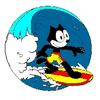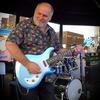dp

Joined: Feb 26, 2006
Posts: 3546
mojave desert, california





|

Posted on Mar 14 2006 06:44 PM
Do you like compression?
What type of compression do you like, and why?
Do you use it pre- or post- or both? In other words, do you use it as a pedal for your live/recorded sound? or do you utilize compression as a mixdown and mastering tool?
Do you like analog tape based compression? How about compression in the digital world?
inquiring minds would like to know what you think...
-dp
|
WR

Joined: Feb 27, 2006
Posts: 3832
netherlands




|

Posted on Mar 17 2006 03:35 PM
dave, if nobody's jumping I will -
as an effect I HATE compression, but i think you can't do without it when recording. I have some lousy below homestudio grade comps. I ll use them directly on the kick, snare and toms when recording drums. bass too while recording. - guitars not, maybe in the mix. - and a tad over the overall mix. I try to keep it as mild as possible, and listen back how little I can get away with.
DW rcommended the Keeley compressor for guitar, if any, a while back on the yahoo group.
WR
— Rules to live by #314:
"When in Italy, if the menu says something's grilled, don't assume it is."
https://www.facebook.com/The-Malbehavers-286429584796173/
|
jhawkdville

Joined: Mar 04, 2006
Posts: 52
Encinitas, CA
|

Posted on Mar 18 2006 12:54 AM
dp
Do you like compression?
What type of compression do you like, and why?
Dave,
Compression is a necessity when mastering, which is typically accomplished with a multiband compressor. A compressor (functioning more as a limiter) is also the key to loud, slammin' tracks that jump out of your speakers. It's also easy to misuse as "loudness wars" causes people to create tracks whose average level is close to 0 dB (the full loudness of your playback device; e.g., CD player).:roll:
When tracking, mild compression (about 2:1 or 3:1 ratio) can be used on the bass to keep it "even" throughout the track (not too loud, not too soft). For me with "The Lost Boys..." it sometimes has been applied in post-production to preserve "options". (Once you record w/effects incl. compression, you can't undo it.) It's not necessary to compress the bass if your bassist can play with reasonably even dynamics.
People sometimes use compression on a guitar during tracking as an effect to increase sustain (like with the Boss CS-3 stompbox). For surf instro, it's generally not necessary to get that Tom Scholtz sustain that lasts for 4+ bars! Of course, if your music requires a violin-y type guitar part, go ahead and use a compressor either when tracking or post-tracking (mixdown). A compressor (stomp box, rack unit, or plug-in) is a useful tool to keep in the arsenal. Knowing when and how to use it separates the men from the boys.
~ Jonathan
|
jhawkdville

Joined: Mar 04, 2006
Posts: 52
Encinitas, CA
|

Posted on Mar 18 2006 01:25 AM
dp
Do you like analog tape based compression? How about compression in the digital world?
The LBOP world sometimes uses analog tape based compression using the PSP Vintage Warmer DXi plug-in. It all depends on the music at hand. We don't automatically use it unless there's a reason for it.
We also use the excellent plug-ins provided in Sound Forge 8 (Sonitus). Hardware compressors are available in our studio (Joe Meek box, Focusrite channel and CS-3 stompbox) but they're hardly ever used. Bottom line: compression is applied solely in the digital domain (so far). Guys may want to squash a real analog signal instead or transfer tracks to 2-inch vintage 3M tape...well, that's their right. There is really no WRONG or RIGHT way to compress. No need to argue which way is better (ala Macs vs. Windows PC, Coke vs. Pepsi, etc. etc.)... Just do it and present your stuff to the world.
~ J
|
dp

Joined: Feb 26, 2006
Posts: 3546
mojave desert, california





|

Posted on Mar 18 2006 02:19 PM
LBOPdot_Net_
We also use the excellent plug-ins provided in Sound Forge 8 (Sonitus).
I too like the Sound Forge/ Sonitus plug-in compression, but I mainly use it in the final mastering stage of a track. I am attempting to produce tracks that have the dynamics (power or well-defined bass frequencies) of contemporary recordings, while still presenting the high-end "shimmer" of old-time AM radio. My experiments focus on capturing high fidelity signals during the recording stage, and preserving these frequencies during the mix stage. Finally, during the mastering stage, I attempt to reign-in the overly-powerful frequency bands by using global EQ and a touch of global compression. I like running the track through a Neve EQ console emulation plug-in...in other words...I utilise a "sim-studio" tool to send tracks "back-in-time", so to speak.
Back in the olden days, I used the inherant compression of my Tascam PortaStudio cassette 4-track to mash-out the overactive frequencies. That technique would produce an early-Who-like distortion on the track. I didn't do much mastering back then, though...my low budget didn't allow for any fancy stuff like that.
-dp
|
Thor

Joined: May 21, 2006
Posts: 38


|

Posted on May 29 2006 03:34 AM
Doesn't Sound Forge come with a compression plugin called "Wave Hammer"? I've used that one and found the guitar preset pretty helpful as a starting point.
Driving hard to analog tape produces a compression of the signal, but not in a linear fashion, and not without artificacts (distortion).
You will find a lot of people bashing on compression, complaining about the lost dynamics, about radio top 40 garbage. Well let me tell you, the only thing worse than an over-compressed track, is an under-compressed track.
Compression makes things sound big, and it does this in two ways -- it allows you to crank the volume without clipping (distortion) by only reducing the volume of the peaks, and it reletively boosts the sound of the room (reverb). Without compression, a recording may not only sound quiet, but empty.
But like anything, be careful to not over-use it.
— Monsters From Mars
http://monstersfrommars.com
|
MaxReverb

Joined: Dec 28, 2006
Posts: 20
|

Posted on Jan 31 2007 12:54 AM
I don't like Compression when tracking, at 24bit I'm not too worried about saturation. However recording without Compression is idiot proof.
When playing live it depends on what I'm doing. It's good for controlling distortion and I like the extra sustain wtih clean guitar.
|
Chopper

Joined: Jul 13, 2006
Posts: 271
Pennsylvania
|

Posted on Feb 01 2007 12:15 AM
I think compression is one of the main effects to clean tone. But a dab 'ell do ya. I'll add I am using solid state digital so take it for what its worth. I like funk too 
Votes wee bit o compression 
*Marshall (did I say that?) Edward Compressor pre.
Last edited: Feb 01, 2007 09:22:34
|
NoisyDad

Joined: Mar 04, 2006
Posts: 215
West Hartford, CT





|

Posted on Feb 01 2007 07:49 AM
I have a gray Ross compressor pedal that I bought on sale in the 80's (I can't believe what they go for now on eBay!). I use it in live situations with a light compression setting (10:00 on the dial) and a volume boost to make the leads jump out. It smooths out some of my rough edges and I don't have to fiddle with the volume knob on the guitar while transitioning from rhythm to leads.
When recording, I put the Ross inline to the amp when recording guitar, as opposed to compressing the miked signal coming out of the amp. I find I get a more pleasing tone (to me, anyway) that way.
When mixing down, I put a little compression (Alesis Nanocompressor) on the whole mess to tame any pesky transient peaks that might have gotten by in tracking. Helps make a nice, even-sounding mix.
— http://www.aquatudes.com
http://www.facebook.com/theaquatudes
|
LHR

Joined: Aug 23, 2006
Posts: 2123
The jungle









|

Posted on Feb 14 2007 05:15 PM
My band is going to record our practice tomorrow. Anyhow, I am recording digitally from a mixer to a little outboard 16-bit/48kHz line-level-to-USB A/D converter and previously I have noticed a bit of clipping. And it is that digital clipping, very nasty stuff. Since we are going live to 2-tracks via 16-bit, I procured an Alesis Nanoverb compressor for limiting. I assume I will need to use the Peak mode but I was wondering if anyone had any suggestions as far as threshold, ratio, attack, and release parameters. (Don't worry if you don't have the Alesis unit, any opinions would be appreicated.) I am a little nervous about using a compressor or limiter on the whole mix and live but those transients are killing the tunes. And that relatively low resolution means that if I lower the A/D input gain, I am missing out. There is not really enough there to work with later, in software.
Thanks!
— SSIV
|
Kawentzmann

Joined: Feb 27, 2006
Posts: 1062
Berlin, Germany

|

Posted on Feb 15 2007 06:36 AM
A standard peak limiting set-up is ratio to eternal, attack 10 ms, release 0,3 sec.
I always uses this setting for tracking with a threshold that makes the lights go just once in a while and the output at 6dB usually.
KK
— The Exotic Guitar of Kahuna Kawentzmann
You can get the boy out of the Keynes era, but you can’t get the Keynes era out of the boy.
|
dp

Joined: Feb 26, 2006
Posts: 3546
mojave desert, california





|

Posted on Feb 15 2007 10:25 AM
Kawentzmann
... the output at 6dB usually.
6 dB is just right for tracking....
-dp
|
LHR

Joined: Aug 23, 2006
Posts: 2123
The jungle









|

Posted on Feb 15 2007 02:34 PM
Those settings seem very counterintuitive. I'll try it, though. Thanks.
— SSIV
|
Kawentzmann

Joined: Feb 27, 2006
Posts: 1062
Berlin, Germany

|

Posted on Feb 16 2007 02:57 AM
LHR
Those settings seem very counterintuitive. I'll try it, though. Thanks.
what about0-20 15 -60 and -110 - +120 ?
Like it better? 
— The Exotic Guitar of Kahuna Kawentzmann
You can get the boy out of the Keynes era, but you can’t get the Keynes era out of the boy.
|
LHR

Joined: Aug 23, 2006
Posts: 2123
The jungle









|

Posted on Feb 16 2007 04:56 PM
Well, I obviously need to learn more about compression/limiting. (My only experience is the MXR DynaComp, very simple).
Since I have the Alesis Nanocompressor, I was not sure what the "tick" marks on the dials were, I will have to get a calculator and sort that out, assuming they have a linear scale. I did try to get those settings you recommended and what I found was a lot of pumping/breathing. So I just fiddled around and got a sound by ear, mainly (always dangerous if you want to re-create it later). But I did get it to limit. Here is the raw, right from the hard disk stereo track:
http://www.rhodesdigital.com/scubatones/banzai.mp3
Thanks for your help. Howerver. this all may be moot. Just when I get a hardware compressor, I suddenly have my eye on the Alesis io26:
http://www.alesis.com/product.php?id=96
— SSIV
|
dp

Joined: Feb 26, 2006
Posts: 3546
mojave desert, california





|

Posted on Feb 16 2007 09:20 PM
LHR
...Here is the raw, right from the hard disk stereo track:
http://www.rhodesdigital.com/scubatones/banzai.mp3
sounds like you got rid of the "clipping" on the guitar track! nice sound.
the cymbals sound a bit hot (high level?)...but it could be because I'm listening to your track over my crappy laptop speakers...
good job!
-dp
|
Rio

Joined: May 22, 2006
Posts: 500
Hamilton, Ontario


|

Posted on Apr 01 2007 10:23 AM
when playing live, I use a Keeley, but I don't use it while recording; I'll apply compression to guitar tracks on mixdown, and then several layers of compression (a little at a time) in mastering
the three newer songs are recorded in my studio:
http://www.myspace.com/thebluedemons
— http://www.facebook.com/?sk=lf#!/rockinrio.delrosa
http://www.facebook.com/?sk=lf#!/TheHighTides
http://www.facebook.com/?sk=lf#!/pages/The-Blue-Demons
|
Chopper

Joined: Jul 13, 2006
Posts: 271
Pennsylvania
|

Posted on Apr 01 2007 09:46 PM
I am a compressor luuver 
Just got a Visual Sound Route 66 pedal and can't recommend one enough. Its gives my Solid State Fender Amps a tube like sag. The feel and tone (fellow tone chaser) a compressor gives me is invaluable IMO. I'm thinking magical tonal properties here. Thickens it up. Just great tone. For jazz, funk and fusion I couldn't see playing without it.
At the same time I can see how compression could kill dynamics. I think the use of one to 'just color the sound a little' is a good thing though. I'm thinking transparent.
I have a hard time turning mine off.
A still tubeless lead life...
Chop
|
estreet

Joined: Mar 17, 2007
Posts: 839
United Kingdom


|

Posted on Apr 11 2007 06:53 AM
If you are playing or recording quietly, then a neat trick is to use mild compression from a pedal after the reverb tank. This has the effect of 'ducking' the amount of reverb whilst you are playing, but bringing up the volume of the reverb tail in the gaps. Very useful for giving a heavily reverbed sound that doesn't swamp the notes of the melody.
However, if you are playing loud, then the chances are that the natural compresion of a tube amp is doing this for you.
— http://www.myspace.com/thepashuns
Youth and enthusiasm are no match for age and treachery.
|






























